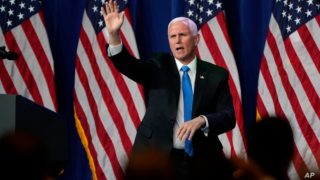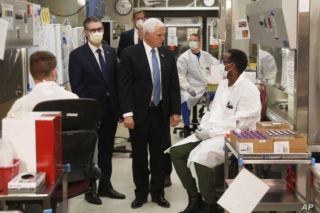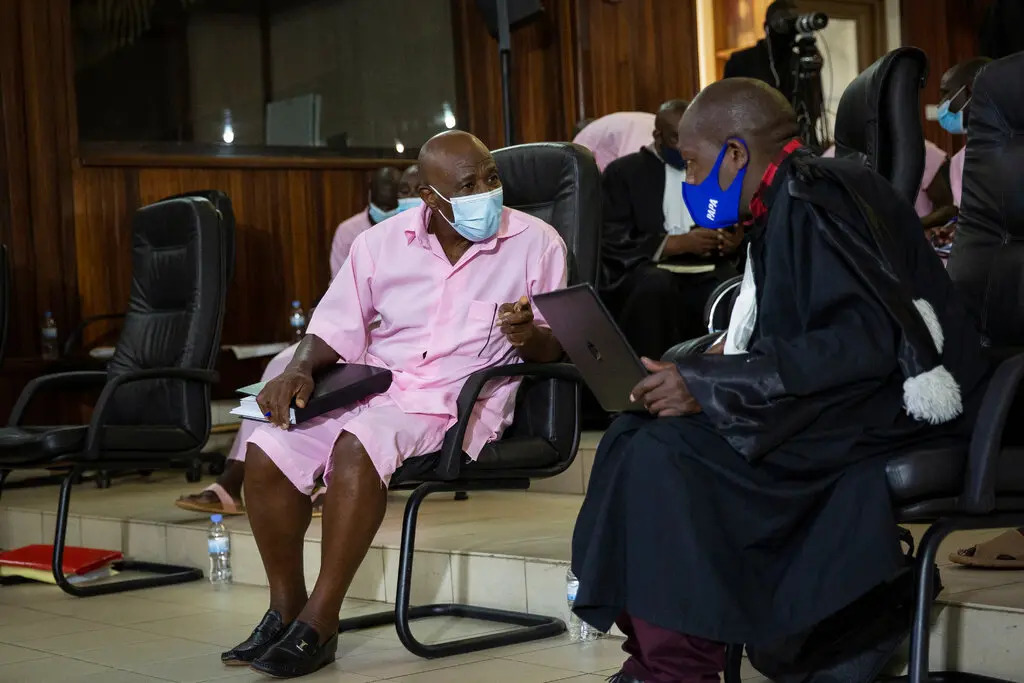WASHINGTON – U.S. Vice President Mike Pence takes center stage Wednesday night at the Republican National Convention, a loyal ally of President Donald Trump during their nearly four years at the top of the American government.
Pence is speaking from Fort McHenry in Baltimore, Maryland, where U.S. soldiers defended the young United States from a British attack in 1814, inspiring the writing of the U.S. national anthem, “The Star-Spangled Banner.” It is a venue in keeping with the Republicans’ convention theme of “Honoring the Great American Story.”
Pence was relatively unknown nationally four years ago when Trump, a first-time politician, picked him as his running mate. At the time, Pence was the governor of the Midwestern state of Indiana after a six-term stint as a congressman, a total of 16 years in which he built a solid conservative policy record but was facing a difficult re-election contest for another term as governor.
Conservative credentials
Trump, as much as anything at the time, needed Pence’s conservative credentials to bolster his underdog chances against Democrat Hillary Clinton. Pence, married to his schoolteacher wife, Karen, for 35 years, was the polar opposite of Trump, a brash New York developer and reality TV show host on his third marriage.
Moreover, Pence had built an unparalleled link to evangelical Christians, an important mostly Republican bloc of conservative voters that might total a quarter of the U.S. electorate. In his upset 2016 victory, Trump won a huge portion of the evangelical vote, in no small part because of Pence’s place on the national Republican ticket.
From his earliest days as a politician, Pence has described himself as “a Christian, a conservative and a Republican, in that order.”
Extraordinary loyalty to Trump
Now, after serving as second in command at the White House, Pence could well embrace a fourth characteristic as part of his biography: extraordinary loyalty to Trump as together they seek re-election on November 3 against the Democratic ticket of former Vice President Joe Biden and his vice-presidential running mate, California Senator Kamala Harris. Pence and Harris are set to debate each other on October 7, with Trump and Biden debating three times, starting in late September.
Pence has rarely skipped a chance to praise his boss, the president.
A rare criticism
However, in a rare criticism during the 2016 campaign, after a video emerged of Trump making lewd comments about women, Pence said, “I do not condone his remarks and cannot defend them.” But as his vice president, Pence unsparingly prefaces his public policy remarks by lauding the man who put him in the political spotlight with such encomiums as “Under the leadership of President Trump….”
At one 2017 Cabinet meeting, Pence offered 14 separate commendations for Trump, seated directly across the table, in less than 3 minutes – one every 12 seconds or so.
“You’ve spurred an optimism in this country that’s setting records,” Pence told Trump. “I’m deeply humbled, as your vice president, to be able to be here.”
Turning to Indiana politics
The 61-year-old Pence grew up in Indiana, earned a law degree and practiced as a lawyer for a while but soon turned to politics. He lost his first two contests for a seat in the House of Representatives in 1988 and 1990 but kept his voice and face before Indiana residents as a conservative radio and TV talk show host from 1994 to 1999.
Finally, in 2000, he won the first of six two-year terms in the House, where he compiled a staunch conservative voting record and climbed the Republican party leadership ladder. During one term, he was chairman of the Republican Study Committee, a group of conservative lawmakers, but he lost a contest to become the Republican minority leader at a time Democrats controlled the House. During his 12 years in the House, he introduced 90 bills and resolutions, but none of them became law.
Won governorship
Pence won the Indiana governorship in 2012 and again amassed a conservative portfolio. He signed measures intended to restrict abortion and cut taxes, along with a law blocking local governments in the state from requiring businesses to pay wages and benefits to workers more than that required by federal law.
In an issue that drew national attention, Pence signed a measure called the Religious Freedom Restoration Act, which allowed individuals and companies to assert as a defense in legal proceedings that their exercise of religion was or was likely to be substantially burdened if they were required to treat all customers alike in commercial transactions. Conservatives in the state and elsewhere viewed the law as a way to contest the legalization of same-sex marriages.
Political retreat
But after vocal protests from moderate Republicans and businesses who said they would refuse to move to the state or expand existing operations, Pence retreated and amended the law to prohibit discrimination based on sexual orientation and gender identity.

Vice President Mike Pence visits the molecular testing lab at Mayo Clinic Tuesday, April 28, 2020, in Rochester, Minn., where he toured the facilities supporting COVID-19 research and treatment.
Taking charge of coronavirus task force
As the coronavirus swept into the United States in early 2020, Trump handed Pence his biggest White House role, as overseer of the government’s effort to curb the spread of the virus and coordinate its testing and treatment efforts while also initiating research to develop a vaccine.
For days on end, Pence chaired meetings of the White House coronavirus task force and often updated the country on the status of the fight against the virus at daily nationally televised briefings. But Trump, facing a difficult re-election contest against Biden, soon took over the daily news conferences and often professed that the virus was under control, or soon would be, and that a vaccine would be developed before the end of 2020.
Adopting a rosier outlook
Pence also often adopted a rosier outlook on the state of the virus in the U.S., even as tens of thousands of Americans died and tens of millions of workers lost their jobs.
Pence repeated Trump’s mantra that the number of cases was rising in the U.S. because the country was doing more testing, which ignored the fact that by June the virus was surging again in states and cities that had largely escaped the initial outbreak in March and April. Pence, in private meetings with Republican senators, urged them to focus on “encouraging signs” in the country’s battle against the virus.
In mid-June, Pence, in an opinion article in the Wall Street Journal, said panic over the coronavirus was “overblown.”
He declared, “Thanks to the leadership of President Trump and the courage and compassion of the American people, our public health system is far stronger than it was four months ago, and we are winning the fight against the invisible enemy.
“We’ve slowed the spread, we’ve cared for the most vulnerable, we’ve saved lives, and we’ve created a solid foundation for whatever challenges we may face in the future,” he concluded. “That’s a cause for celebration, not the media’s fear mongering.”
Pandemic slowed, not abated
Despite Pence’s view, the surge of the pandemic has only slowed, not abated. The death toll in the U.S. has now topped 177,000, according to Johns Hopkins University, and the number of confirmed cases totals more than 5.7 million, with both figures higher than in any other country.
FEATURED IMAGE: Vice President Mike Pence waves after speaking during the first day of the Republican National Convention, Aug. 24, 2020, in Charlotte, N.C.
By Ken Bredemeier/VOA






